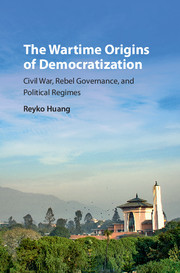Description
The Wartime Origins of Democratization
Civil War, Rebel Governance, and Political Regimes
Problems of International Politics Series
Author: Huang Reyko
Why do some countries democratize after civil war? Huang argues that war can foment popular demand for radical political change.
Language: English
Subject for The Wartime Origins of Democratization:
Approximative price 77.68 €
In Print (Delivery period: 14 days).
Add to cart
The Wartime Origins of Democratization
Publication date: 10-2016
Support: Print on demand
Publication date: 10-2016
Support: Print on demand
Approximative price 32.87 €
In Print (Delivery period: 14 days).
Add to cart
The Wartime Origins of Democratization
Publication date: 08-2017
Support: Print on demand
Publication date: 08-2017
Support: Print on demand
Description
/li>Contents
/li>Biography
/li>
Why do some countries emerge from civil war more democratic than when they entered into it, while others remain staunchly autocratic? Observers widely depict internal conflict as a pathway to autocracy or state failure, but in fact there is variation in post-civil war regimes. Conventional accounts focus on war outcomes and international peacebuilding, but Huang suggests that postwar regimes have wartime origins, notably in how rebel groups interact with ordinary people as part of war-making. War can have mobilizing effects when rebels engage extensively with civilian populations, catalyzing a bottom-up force for change toward greater political rights. Politics after civil war does not emerge from a blank slate, but reflects the war's institutional and social legacies. The Wartime Origins of Democratization explores these ideas through an original dataset of rebel governance and rigorous comparative case analysis. The findings have far-reaching implications for understanding wartime political orders, statebuilding, and international peacebuilding.
1. Introduction; 2. War-making, mobilization and democratization; 3. Rebel governance: how rebels interact with ordinary people during conflict; 4. Testing the effects of rebel governance on postwar democratization; 5. Tracing the steps from war time to peace time: case studies overview; 6. War and change in Nepal; 7. War and postwar regime formation in Uganda, Tajikistan and Mozambique; 8. Conclusion.
Reyko Huang is an Assistant Professor at the Bush School of Government and Public Service at Texas A & M University.
© 2024 LAVOISIER S.A.S.




